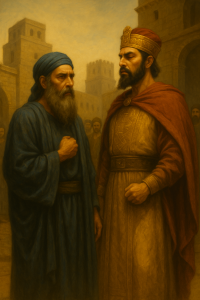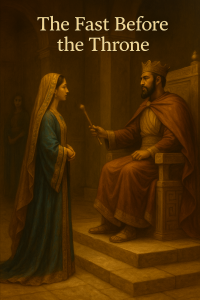The Story of Esther and the Call of Courage

The Fall of Queen Vashti
In the grand palace of King Xerxes, power and pride filled the air like incense. Queen Vashti was beautiful, poised, and brave — but she was also her own woman.
One night, after a week-long feast, the king—deep in drink—summoned her to parade before his guests, a demand meant to display her beauty for their entertainment. But Vashti refused.
That one word — no — shook an empire. Her refusal wasn’t rebellion; it was dignity. Yet it cost her everything. She was stripped of her crown and banished from the palace.
Vashti’s silence echoes even now — a reminder that courage sometimes looks like quiet defiance in the face of power.

The Rise of Esther
After Vashti’s banishment, the kingdom turned its gaze to finding a new queen — a woman who would please the king and bring honor to the crown.
Among the many young women brought into the palace was Esther, a Jewish girl raised by her cousin Mordecai. She wasn’t of noble birth, but her heart was filled with quiet strength and humility.
The palace was a world of perfumes and politics, where every glance and gesture was measured. Yet Esther found favor wherever she went — not because she sought attention, but because her grace reflected something deeper: the beauty of faith.
In time, she was chosen as queen. But her crown would come with a purpose far greater than luxury or recognition. God was placing her exactly where she needed to be — even if she couldn’t yet see why.

Mordecai’s Courage and Haman’s Pride
Not long after Esther became queen, her cousin Mordecai found himself standing against the rising tide of pride in the royal court. A man named Haman, second only to the king, demanded that all should bow before him. But Mordecai refused.
His loyalty to God outweighed his fear of man. Even when it brought him into danger, he would not bend his knee to arrogance.
Haman’s heart burned with hatred. His pride could not stand the sight of a single man who wouldn’t bow. So he plotted not only against Mordecai but against all of Mordecai’s people — the Jews — seeking to destroy them completely.
Yet even in the shadows of deceit and danger, God was at work. A courage was stirring in Esther that would soon rise to meet this evil head-on.

The Fast Before the Throne
When Haman’s plan to destroy the Jews spread through the kingdom, fear took hold. Mordecai tore his clothes, covered himself in ashes, and pleaded for mercy at the palace gates.
When word reached Esther, she was shaken. She lived in luxury — yet her people were marked for death. Mordecai’s message to her was firm and full of faith:
“Who knows whether you have come to the kingdom for such a time as this?”
Esther could have hidden her identity and stayed safe, but she didn’t.
Instead, she called for a fast — three days of prayer and no food or drink. She and her maidservants joined her people in seeking God’s favor.
After three days, Esther put on her royal robes and approached the throne uninvited — an act that could cost her life. But as she stepped into the king’s presence, Xerxes extended his golden scepter, sparing her.
That moment changed everything. It was courage clothed in humility — faith lived out loud.

Faith in Today’s World
Esther’s story isn’t just history — it’s a mirror.
We may not live in palaces or face royal decrees, but we still stand in moments that test our faith.
Like Vashti, some are called to stand for dignity.
Like Mordecai, some must speak truth even when it’s risky.
Like Esther, many are placed in quiet corners of influence “for such a time as this.”
In a world that praises comfort over conviction, faith often looks like showing up anyway — praying even when no one else will, loving even when it’s not returned, forgiving when bitterness feels easier.
Religion may divide, but The Way calls us to live differently:
to love with boldness, to act with compassion, and to trust that obedience, not popularity, is what brings light into dark places.
So, wherever you are — in your home, your work, your circle — remember:
Courage doesn’t always roar.
Sometimes it whispers, “I’ll keep trusting God.”

“For such a time as this, may we each find the courage to rise, to love, and to follow The Way — even when the world doesn’t understand.”